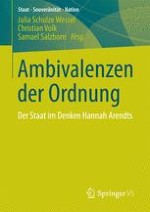2013 | OriginalPaper | Chapter
Über das Lager – die Vernichtung des Menschen als Menschen in der Totalen Herrschaft1
Author : Michal Aharony
Published in: Ambivalenzen der Ordnung
Publisher: Springer Fachmedien Wiesbaden
Activate our intelligent search to find suitable subject content or patents.
Select sections of text to find matching patents with Artificial Intelligence. powered by
Select sections of text to find additional relevant content using AI-assisted search. powered by
